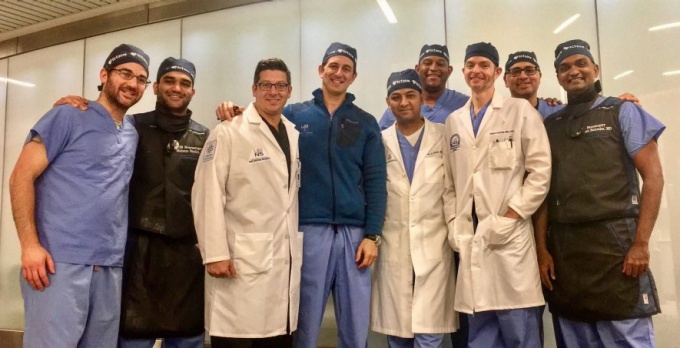Neuroendovascular Fellowship

Our neuroendovascular fellowship program is world-renowned for its pioneering advancements in neuroendovascular procedures and conducting cutting-edge research for neurological disorders.
Our CAST-Accredited fellowship in Buffalo is known world-wide as one of the premier endovascular neurosurgery fellowships, led by Fellowship Director Dr. Adnan Siddiqui and Chairman Dr. Elad Levy, and with significant clinical and academic contributions from Drs. Kenneth Snyder, Jason Davies, and Rosalind Lai.
The UBNS fellowship distinguishes itself through a remarkable case volume of 2000 endovascular procedures annually. Fellows are fully immersed in the latest endovascular techniques and patient care at Jacobs School of Medicine and Biomedical Sciences, and through involvement with research at the Canon Stroke and Vascular Research Center and at Jacobs Institute, leading centers for technological innovations.
This unique blend of hands-on experience, exposure to the state-of-the-art technology, and active participation in major clinical trials and translational research, position our fellows for success, as evident in the program’s legacy of producing leaders who have made significant contributions to the field, both within the US and internationally.
Requirements
The endovascular fellowship is open to applicants who have completed an ACGME-accredited residency training program in either neurosurgery or neuroradiology.
All candidates for fellowship must have completed at least 12 months (preferably consecutive) of neuroradiology training. In addition, all endovascular surgical neuroradiology fellowship candidates must be skilled in catheter-based techniques.
Candidates with a neurosurgery background must have fulfilled the following preparatory requirements, in addition to the common requirements cited above:
- completion of an ACGME-accredited residency program in neurological surgery
- completion of a course in basic radiology skills
The basic radiology skills and neuroradiology training may be acquired as an elective at some point during the neurological surgery residency. Alternatively, the applicant can fulfill these requirements during the first year of fellowship training at UBNS.
Candidates with a radiology background must have fulfilled the following preparatory requirements, in addition to the common requirements cited above:
- completion of an ACGME-accredited residency in diagnostic radiology
- completion of three (3) months of clinical experience in an ACGME-accredited neurological surgery program
The clinical requirement may be acquired as an elective during diagnostic radiology and/or neuroradiology training.
Application Process
Applications for the endovascular surgical neuroradiology fellowship are accepted on an ongoing basis. Candidates are required to send the following:
- updated CV
- cover letter describing career goals and anticipated start / end dates for fellowship training
- three (3) letters of recommendation
- any Visa requirements
The above documents should be forwarded to:
Neuroendovascular Fellowship Director

University at Buffalo Neurosurgery 100 High Street Section B4 Buffalo, NY 14203
Phone: 716-218-1000
Email: as257@buffalo.edu
Candidate packets will be reviewed no less than monthly by the endovascular faculty members: Elad Levy, MD, MBA; Adnan Siddiqui, MD PhD; Kenneth Snyder, MD, PhD; Jason Davies, MD, PhD; and Rosalind Lai, MD. Once the faculty has made their decision, candidates will be notified of possible interview dates. Upon acceptance into the program, the candidate will receive an offer letter confirming dates of fellowship. Candidates are requested to sign and return a confirmation of receipt and an acceptance of the offer.
Subsequent correspondence to the candidate will entail all documents regarding hospital credentialing, licensure, university appointment, and human resource matters.
Contact
For further information please contact:
Administrative Assistant
Elizabeth M. Shisler
Senior Staff Assistant
Department of Neurosurgery
Email: emczosek@buffalo.edu